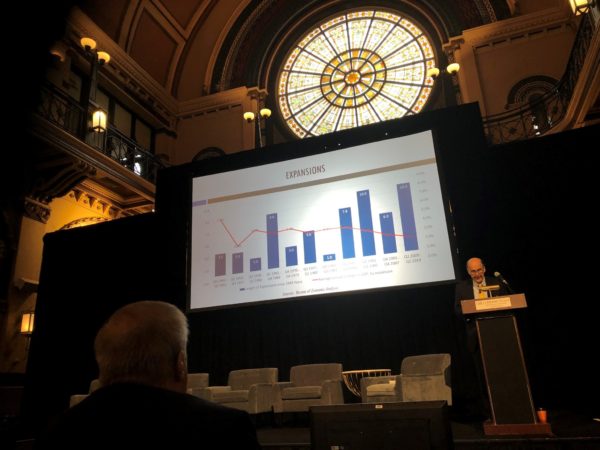The new normal: Slow, steady growth
INDIANAPOLIS, Ind. – There’s little sign a recession is imminent, but economic growth will continue to be slow and steady.
That was the projection from Jack Kleinhenz, chief economist with Kleinhenz & Associates, who gave an economic update at the FTR Transportation Conference Sept. 11. He acknowledged the long-running economic expansion is slowing, but added “I’m relatively optimistic about the economy.”
Consumer spending and domestic demand remains strong.
“The U.S. economy remains resilient,” said Kleinhenz. “In response to the trade war, I think it will weigh on trade growth, but I have the expectation some kind of trade truce will be enacted. The overall macro-conditions are not signaling a recession; I’d say more of a slowdown.”
He did admit uncertainty remains high among consumers, which could have an affect on their spending.
Eric Starks, CEO of FTR, expanded on how slowing economic growth will affect transportation. He noted inventory levels are currently high, due to a build-up in the third quarter of last year, placing constraints on freight growth.
Manufacturing is expected to remain flat, marking a correction.
“We are hearing things are starting to stabilize, things aren’t falling off a cliff,” Starks said. “But that doesn’t generate a substantial amount of freight, it basically holds the freight market where it is. We’re in a holding pattern. But this market is not used to a holding pattern. We don’t know how to hold steady – it freaks us out.”
Active truck utilization is on the decline, from nearly 100% in 2018 to about 88%.
“This is what makes people nervous,” Starks said, adding truckers shouldn’t be running for the hills. “It’s a steady-as-she-goes type of market.”
But lower capacity utilization results in softer rates. “We’ve seen rates coming back down and easing,” Starks said. But he added “relative to history, rates are still at very, very healthy levels historically.”
“This is an environment where market conditions are still relatively healthy,” Starks said. “What happened was, 2018 was so unusually strong, it distorted a lot of things that were happening in the marketplace. As we come back down to normal, we’re now trying to understand, what does normal mean?”
Starks also refused to sound alarms about sharply falling Class 8 truck orders.
“What we saw last year was a huge increase in order activity,” he said, adding normally slow summer months saw abnormally high order activity. “We hit record levels at a time when, seasonally, we should’ve seen soft order activity. The decline we’ve seen recently is not unexpected. This is a normalization of what’s happening. Backlogs continue to be very healthy.”
When speaking to the issue of productivity, Starks said truckers should focus on decreasing detention time. An increase of 1 mph, if adopted industry-wide, would increase truck capacity by 2.5%. However, reducing detention time at loading docks by 30 minutes a day would see a 5.5% boost to capacity.
“So, where do you want to put your focus?” asked Starks. “This tells me things like hours-of-service and how well you do at the loading dock has a larger impact than investment in infrastructure and trying to get average speeds up. We need to understand, what is the impact? If we can get back 5.5% capacity, that would be huge.”
In summary, Starks said FTR sees the transportation market as stable. However, he added “As of now, there’s still a little more downside risk than upside risk to the market.”

Have your say
This is a moderated forum. Comments will no longer be published unless they are accompanied by a first and last name and a verifiable email address. (Today's Trucking will not publish or share the email address.) Profane language and content deemed to be libelous, racist, or threatening in nature will not be published under any circumstances.